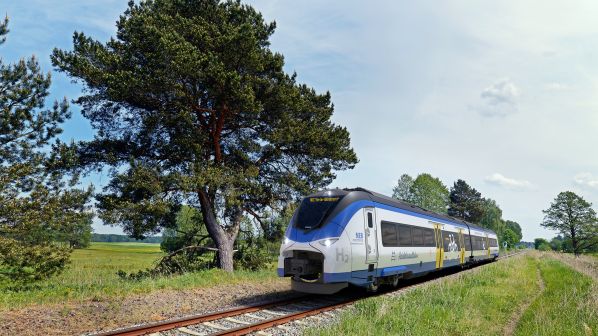BERLIN and Brandenburg operator and infrastructure manager Niederbarnimer Railway (NEB) has ordered seven two-car Mireo Plus H trains from Siemens Mobility for the Heidekrautbahn network (RB27). They will be equipped with a fuel cell drive system and a lithium-ion battery and will be CO2 emission-free.
The Mireo Plus H is a second-generation hydrogen-powered train with 1.7MW of traction power providing acceleration of up to 1.1m/s2 and a maximum speed of 160km/h. Siemens says the train has the lowest lifecycle costs on the market with self-supporting, welded and integral lightweight aluminium construction, and can be refuelled in 15 minutes.
The two-car trains feature spacious interiors, with free Wi-Fi, real-time passenger information displays, a specially designated family area, and two multi-purpose areas with space for buggies, wheelchairs and up to 12 bicycles. The powered cars have three doors on each side to enable passengers in wheelchairs or with buggies to easily board or leave the train, even at stations with lower platforms.
The contract includes service and spare parts over 10 years to 2034. This comprises all necessary maintenance, servicing and repair activities, along with continuous further development and adaptation of the fleet.
The use of hydrogen-powered trains on the Heidekrautbahn is part of a joint pilot project funded by the federal government and the states of Berlin and Brandenburg. The project is focused on setting up a regional, sustainable hydrogen infrastructure that also includes a hybrid power plant and a tank system.
NEB and the states of Berlin and Brandenburg concluded an agreement for the deployment of hydrogen fuel cell trains in the German capital region in February. The agreement enabled the parties to start preparations for hydrogen train operation on the Berlin-Wilhelmsruh - Basdorf line, which is due to reopen to passenger service in 2024.
For detailed data on fleet orders from around the world, subscribe to IRJ Pro.

